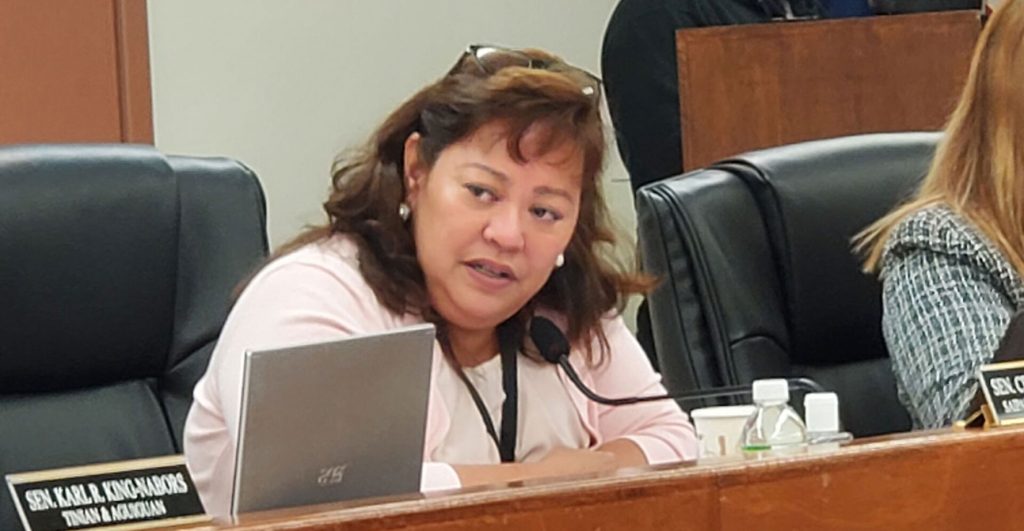Budget eyes 1-time BGRT increase just for FY 2024
Gov. Arnold I. Palacios’ proposed budget for the government’s operations in fiscal year 2024 includes a proposal to increase the Business Gross Revenue Tax beginning in the second quarter of fiscal year 2024 for an additional estimated revenue of $9.1 million. This early, some senators believe this one-time increase will result in a hot-button tussle between the Senate and the House of Representatives.
Speaking before the Senate Fiscal Affairs Committee’s Fiscal Year 2024 budget hearing last Friday, Finance Secretary Tracy B. Norita went over three highlights in their revenue forecast, including the proposal to increase the BGRT rates.
Under the governor’s proposal, taxpayers whose earnings range between $100,000 and $250,000, there will be a .5% increase in BGRT, Norita said. Those that make between $500,000 and $750,000 will see a 2% increase, while those that make above $750,000 will see a 1% increase.
Sen. Corina L. Magofna (Ind-Saipan) noted that, under the proposal, there is no change to the current 3% BGRT being imposed on those making $250,000 to $500,000, to which Norita agreed.
Right now, based on the current BGRT schedule, the rate is 1.5% for business taxpayers that make between $5,000 and $50,000; for those earning $50,000 to $100,000 it’s 2%; above $100,000 to $250,000 is 2.5%; above 250,000 to $500,000 is 3%; above $500,000 to $750,000 is 4%; and above $750,000 and over is 5%.
Norita explained that what they did for the analysis was take the filing data of tax year 2022 and the rate that they paid and just change that rate to the new rate proposed.
“So that’s our baseline proposal to increase the BGRT rate and, because of that, we calculated approximately $9.1-million revenue projection increase from this proposal,” she said.
Norita said the rates would apply to everybody specific to those brackets.
In order for the fiscal year 2024 projections to be realized, the new BGRT rates would essentially have to be approved as a standalone or as a provision in the budget, said Fiscal Affairs Committee chair Sen. Donald M. Manglona (Ind-Rota).
In response to Manglona’s questions, Norita said they’re proposing the increase just for the next fiscal year and not as a permanent rate. She said the proposed increase will just to allow the government to meet the level of operations that they’re proposing for the year, considering that they just want to meet the basic services they have in fiscal year 2023. She said the BGRT increase, which will be applied only in fiscal year 2024, would give the Legislature the flexibility whether to retain or remove it in the succeeding fiscal year.
Norita said the Legislature can address in the budget bill if it wants the BGRT increase to be a standalone bill or a provision of the budget. “But the more enforcement tools we have, the better,” she said.
Norita said they’re making the assumption that major businesses will—out of their best interest—continue doing business and not go out of business for one year just to skip paying a .5% increase.
Manglona said that, since the House concurrent resolution is now before the Senate, if the Senate does not agree with the tax increases, they will have to essentially reduce the budget ceiling down by $9.1 million.
“So I guess that’s going to be up for discussion as we deliberate on the House concurrent resolution,” Manglona said.
If, for any reason, the Senate rejects the House’s version and incorporates what Norita is suggesting to add the increase in taxes, and the Senate rejects that, then they would go into conference committee to hammer out any differences, said Sen. Celina R. Babauta (D-Saipan).
In essence, Babauta said, it would not be a balanced budget because the expenses would be more than the revenues. “So how do you expect us to reconcile that? We have to cut expenses somewhere if we were to work on the budget together with the House. It will throw everything—the figures, the numbers—out of the window,” the senator said.
Babauta believes the best approach would be a standalone and not incorporate it in the budget bill. “Because this could be a heavy contention between the House and the Senate, which could cause possibly a shutdown. I’m not saying we are. We don’t know what the House version looks like,” she said.
Babauta concedes, though, that it is premature to say that they will go into a conference committee or that the government would shut down. “But I don’t know what to do now with, if we reject this, if the House incorporates it and we reject it, we’re [going to] have to cut expenses as well,” she added.




























